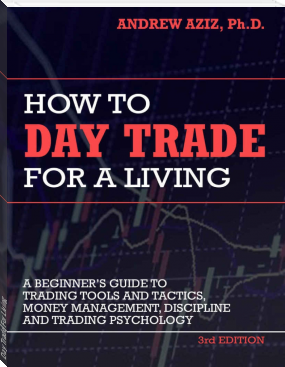Day Trade For Living - Andrew Aziz (best black authors txt) 📗

- Author: Andrew Aziz
Book online «Day Trade For Living - Andrew Aziz (best black authors txt) 📗». Author Andrew Aziz
Some people start to day trade as a hobby or for fun because they believe it is "cool". They trade for the thrill of short term gambling in the markets. They play around a little bit in the market but never commit themselves to acquiring a proper education or an in-depth awareness of day trading. They may get lucky a few times and make some money, but eventually the market will punish them.
This is actually my own story. At the beginning of my trading career, a company called Aquinox Pharmaceuticals Inc. (ticker: AQXP) announced some positive results for one of its drugs, and its stock jumped from $1 to over $55 in just two days. I was a beginner at the time. I purchased 1,000 shares at $4 and sold them at over $10.
What looked like a very good thing however, turned out to be very bad. I had made over $6,000 in a matter of minutes on my first beginner trade, leaving me with the impression that making money in the market was easy. It took me time and several severe losses to get rid of that very mistaken notion.
It was pure luck. I honestly had no idea what I was doing. In just a few weeks, I lost that entire $6,000 by making mistakes in other trades. I was lucky because my first stupid trade was my lucky one. For many people, their first mistake is their last trade because they blow up their account and have to desperately close, leave and say good-bye to day trading .
New day traders should never lose sight of the fact that they are competing with professional traders on Wall Street and other experienced traders around the world who are very serious, highly equipped with advanced education and tools, and most importantly, committed to making money.
Never forget Rule 2: day trading is a business, and it's an intensely serious one. You have to wake up early in the morning, do your preparations every day on the stocks that you plan to trade, and be thoroughly prepared before the market opens. Imagine for a moment that you have opened a restaurant. Can you afford not to be ready for your customers when you open your doors? You can't close the restaurant at lunch time because you aren't feeling well or you're not in the mood or you didn ' t have time to order enough groceries for the kitchen staff to prepare meals with. You must always be ready. The day trading business is no different.
Day trading requires proper tools, software and education. As with any business, you must have the right tools to succeed. So what are the basic tools you need for your day trading business?
Enough capital (money) to trade with (at least $5,000 if outside of the USA and $25,000 if a resident of the United States).
High speed Internet service.
The best available broker .
A fast order execution platform that supports hotkeys.
A scanner for finding the right stocks to trade.
A community of traders .
Some of these tools must be paid for every month. Just as other businesses have monthly bills for electricity, software , licenses and leases , you have to be able to pay your Internet provider ' s monthly bills, your broker 's comm issions , scanner costs and trading platform fees. If you are part of a paid chatroom or community, you can add the cost of that membership to this list too.
Chapter 2:
How Day Trading Works
In this chapter I will review many of the basics of day trading and hopefully answer your questions about what day trading is and how it works. The chapter will also introduce some of the main tools and strategies that you'll come across later in the book. As with any art form, tools are of no value unless you know how to use them. This book will be your guide in learning how to use these tools.
Day Trading vs. Swing Trading
A compelling question to begin with is: What do you look for as a day trader?
The answer is simple. First, you're looking for stocks that are moving in a relatively predictable manner. Secondly, you are going to trade them in one day. You will not keep any position overnight. If you buy stock in Apple Inc. (ticker: AAPL) today, for instance, you will not hold your positon overnight and sell it tomorrow. If you hold onto any stock overnight, it is no longer day trading, it's called swing trading.
Swing trading is a form of trading in which you hold stocks over a period of time, generally from one day to a few weeks. It is a completely different style of trading, and you shouldn't use the strategies and tools that you use for day trading to do swing trading. Do you remember Rule 2, where I mentioned that day trading is a business? Swing trading is also a business, but a completely different kind of business . The differences between swing trading and day trading are similar to the differences in owning a restaurant and a food delivery company. They both involve food, but they are very different: they operate with different time frames, regulations, market segments and revenue models. You should not confuse day trading with other styles of trading just because the trading involves stocks. Day traders always close their positions before the market closes.
Many traders, including myself, do both day trading and swing trading. We are aware that we are running two different businesses, and we have gone through separate educational programs for the two kinds of trading . One of the key differences between day trading and swing trading is the approach to stock picking. I do not swing trade and day trade the same stocks. Swing traders usually look for stocks in solid companies that they know won't lose their entire value overnight. For day trading, however, you can trade anything, including companies that will soon go bankrupt , because you don't care what happens after the market closes. In fact, many of the companies that you day trade are too risky to hold overnight because they might lose much of their value in that short of a period of time.
You have now reached Rule 3 of day trading:
Rule 3: Day traders do not hold positions overnight. If necessary, you must sell with a loss to make sure you do not hold onto any stock overnight.
Buying Long, Selling Short
Day traders buy stocks in the hope that their price will go higher. This is called buying long, or simply long. When you hear me or a fellow trader saying, "I am long I 00 shares AAPL," it means that we have bought I 00 shares of Apple Inc. and would like to sell them higher for a profit. Going long is good when the market is going higher.
But what if prices are dropping? In that case, you can sell short and still make a profit. Day traders can borrow shares from their broker and sell them, hoping that the price will go lower and that they can then buy those shares back at a lower price and make a profit. This is called short selling, or simply short. When people say, "I am short Apple," it means they have sold short stocks of Apple and they hope that prices will drop. When the price is going lower, you owe I 00 shares to your broker (it probably shows as -100 shares in your account), which means you must return I 00 shares of Apple to your broker. Your broker doesn't want your money; they want their shares back. So, if the price has gone lower, you can buy them cheaper than you bought them earlier and make a profit. Imagine that you borrow 100 shares of Apple from your broker and sell them at $100 per share. Apple's price then drops to $90, so you buy back those 100 shares at
$90 and return them to your broker. You have made $IO/ s hare or $1,000. What if the price of Apple goes up to $110? In that case, you still have to buy I00 shares to return to your broker because you owe them shares and not money. Therefore, you have to buy I00 shares at $110 in order to return I 00 shares to your broker. In that case, you will have lost $1,000.
Short sellers profit when the price of the stock they borrowed and sold drops. Short selling is important because stock prices usually drop much more quickly than they go up. Fear is a more powerful feeling than greed. Therefore, short sellers, if they trade right, can make astonishing profits while other traders panic and start to sell off
However, like anything in the market that has great potential, short selling has its risks too. When buying stocks of a company for $5, the worst case scenario is that the company goes bankrupt and you lose your $5. There is
a limit to your loss. But if you short sell that company at $5 and then the price, instead of going down, starts going higher and higher, then there won't be any limit to your loss. The price may go to $10, $20, or $100, and still there will be no limit to your loss. Your broker wants those shares back. Not only can you lose all of the money in your account, but your broker can also sue you for more money if you do not have sufficient funds to cover your shorts.
Short selling is a legal activity for several good reasons . First, it provides the markets with more information. Short sellers often complete extensive and legitimate due diligence to discover facts and flaws that support their suspicion that the target company is overvalued. If there were no short sellers, the price of stocks could unreasonably increase higher and higher. Short sellers are balancing the market and adjusting prices to their reasonable value. Their actions are conducive to the health of the market.
If the price is going to go lower, you may correctly ask, why does your broker allow you to short sell instead of selling stock themselves before the price drops? The answer is that the broker would like to hold their position for the long term. Short selling provides investors who own the stock (with long positions) with the ability to generate extra income by lending their shares to the shorts. Long term investors who make their shares available for short selling are not afraid of short term ups and downs. They have invested in the company for a good reason and they have no interest in selling their shares in a short period of time. They therefore prefer to lend their shares to traders who wish to make a profit from short term fluctuations of the market. In exchange for lending their shares, they will charge interest. Therefore, by short selling, you will need





Comments (0)